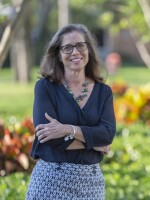There are a lot of stereotypes out there about the millennial generation: they’re disengaged and hyper-focused on technology.
But someday, these 80 million Americans born between 1980 and 1999, will be needing health care. And a lot of it.
That's why the second MediFutureconference this week in Tampa asked a panel of college students for some insight. While the five men and one woman say they may not be using the health care system much now, it's important medicine doesn't assume that technology is all they care about.
These students say they are typical of many college students: they’re educated, have health insurance and work out regularly. And they live a healthy lifestyle – give or take a few extra drinks on the weekend. Most go to the doctor only when needed, say when a shoulder pops out of place or a sinus infection knocks you down.
They say they definitely don’t embrace what they describe as today’s model of health care, where you have a designated primary care physician and wait days or weeks for an appointment. Phil Michaels is getting his MBA at the University of Tampa. He says he wants a relationship with a doctor to be convenient, and on demand.
“I can’t speak for all millennials but this is how I would like to communicate with them. I don’t want to spend two hours of my day driving to the doctor’s office, waiting, seeing the doctor, you know, waiting to check out," Michaels said. "I can text him, I can Skype with him – show him the bruise on my arm – send him a picture message. And I know it’s being done right now, but we need to make sure it’s reaching a mass audience.”
That concept isn't far fetched. Concierge medicine and is an option for people able to pay for the exclusive service.
But some say that convenience shouldn’t diminish the personal interaction between patients and their health care providers. Klaus Grim is a student at the University of Tampa. He says that connection is why he is studying to become a physician’s assistant.
“I kind of disagree. Because I think that’s kind of where medicine exceeds is the patient, the patient doctor relationship," Grim said. "And it’s part of being human and talking to someone face to face."
His need for the human touch is an important reminder to the nearly 600 professionals in health care and tech industries attending the three-day MediFuture event. Participants were wowed by the high-tech, consumer-centered gadgets featured in ballrooms throughout the conference hotel.
Tech company Jawbone pitched its JawboneUP fitness tracker link with a clips on your dog’s collar -- called Whistle-- and a interactive food scale called Prep Pad, done in partnership with the Orange Chef Co.
GuideWell, the parent company of insurer Florida Blue, set up mock bathrooms, workplaces and storefronts to highlight its gadgets. One garnering a slew of questions was an interactive bathroom mirror, where computerized health reports pop up as you start the day.
University of Tampa graduate student Keven Jenkins said technology may be second nature to his generation. But they won’t embrace health apps unless they make sense to the individual, and if they work well.
“I do think there is a lot of opportunity for improvement in regards to that kind of technology," he said. "I use it, but I’m not a tremendous fan at the moment. I think there is still a lot of room still for improvement, as with much technology when it first goes live. “
Dionte Madden, a senior at the University of Central Florida, told the crowd that the fitness tracker his parents gave him as a present goes unused.
He and other panelists said they prefer to go old school – working out with a familiar exercise routine, and using friends and family as accountability buddies. Madden says apps are great at tracking health data, but it’s no fun living by the numbers.
“I’d rather just go and work out because that’s what I’m used to doing. From the student athlete’s perspective, the apps really aren’t that useful because you already know your body and what is best for you,” he said.
And don’t assume these young adults are enamored by scientific advances. Many on the panel said they’re reluctant to undergo genomic testing, which breaks down DNA to predict their chances for serious and potentially deadly disease.
Grim, the aspiring physicians assistant, would rather focus on being well, than worrying too much.
“I wouldn’t want to know… I just think if I find out I have something, I’m not living the life I want to be living beforehand," he said. "…Say I know I have something, I’m going to change my whole life around. And I think life is just so full of surprises.”
He wasn't alone. When it came to that question, only one of the six students was eager to find out what the future held.
--Health News Florida is part of WUSF Public Media. Contact Editor Mary Shedden at (813) 974-8636, on Twitter @MaryShedden, or email at shedden@wusf.org. For more health news, visit HealthNewsFlorida.org.
9(MDAyNDY5ODMwMDEyMjg3NjMzMTE1ZjE2MA001))


Copyright 2014 WUSF Public Media - WUSF 89.7



